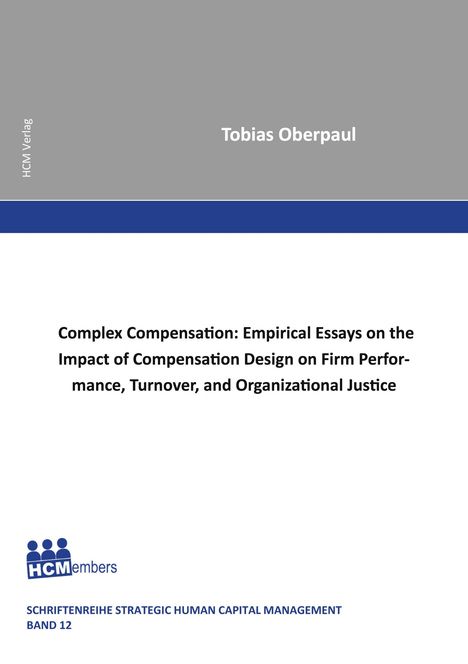Tobias Oberpaul: Complex Compensation: Empirical Essays on the Impact of Compensation Design on Firm..., Kartoniert / Broschiert
Complex Compensation: Empirical Essays on the Impact of Compensation Design on Firm Performance, Turnover, and Organizational Justice
Buch
lieferbar innerhalb 2-3 Wochen
(soweit verfügbar beim Lieferanten)
(soweit verfügbar beim Lieferanten)
Aktueller Preis: EUR 29,90
- Verlag:
- Lmu Institut für Personalwirtschaft, 01/2024
- Einband:
- Kartoniert / Broschiert, Paperback
- Sprache:
- Englisch
- ISBN-13:
- 9783947095117
- Artikelnummer:
- 11737927
- Umfang:
- 200 Seiten
- Gewicht:
- 266 g
- Maße:
- 210 x 148 mm
- Stärke:
- 12 mm
- Erscheinungstermin:
- 19.1.2024
- Serie:
- Strategic Human Capital Management - Band 12
- Hinweis
-
Achtung: Artikel ist nicht in deutscher Sprache!
Klappentext
Compensation contracts have become ever more complex and individualized, particularly in the executive compensation domain, where increasingly diverse stakeholder demands and governance requirements have led to the inclusion of more and increasingly interrelated components into compensation contracts. Even the compensation of lower-level employees has become complex as firms individualize employee compensation and use many different rewards simultaneously. Research has examined elements of compensation in isolation but has attempted to avoid the complexities of compensation. This dissertation examines the consequences of compensation complexity and compensation design dispersion and contributes to a better understanding of compensation and its consequences for firms and employees.The first study examines how the complexity of executive compensation contracts affects firm performance. It finds that CEO compensation complexity negatively affects accounting, market, and ESG (i. e., environmental, social, and governance) metrics of firm performance and explores mechanisms that help explain the relationships. The second study examines the effect of compensation design dispersion within top management teams and its impact on executive turnover. The results show that compensation design dispersion affects executive turnover, both directly and in interaction with relative pay level. The third study addresses the role of compensation design dispersion in the development of procedural justice perceptions. Using two experiments, this study shows that compensation design dispersion causes lower procedural justice perceptions, which appears to be less problematic for participants with relatively easier to understand contracts.
In summary, this dissertation provides a nuanced overview of complex compensation design and compensation design dispersion. The findings contribute to a better understanding of the effectiveness of compensation as an incentive and sorting tool for organizations, and of the implications of compensation design for the functioning of teams.
Anmerkungen:
Bitte beachten Sie, dass auch wir der Preisbindung unterliegen und kurzfristige Preiserhöhungen oder -senkungen an Sie weitergeben müssen.
Mehr von Strategic Human...
-
Felix BölingenEmpirical Essays on Remote Work and Transparency in Performance ManagementBuchAktueller Preis: EUR 29,90
-
Alejandro Hermida CarrilloThe Many Selves in Social Structures - Applications to Corporate Strategy, Work-Life Dynamics, and Cross-Class InteractionsBuchAktueller Preis: EUR 29,90




